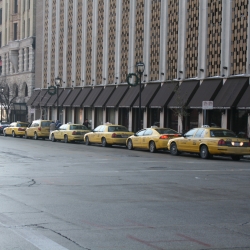Everybody Wants to Drive A Cab
The city has 1,706 applications for 100 cab licenses. Milwaukee is suddenly becoming far more cab-friendly.
It was just last month that the Milwaukee Common Council decided to increase the number taxicab licenses in the city by 100, increasing the total from 320 to 420. Anyone interested in driving a cab could apply for a license.
“My prediction was we would be lucky to get 100 applicants,” says Ald. Bob Bauman, who chairs the Public Transportation Review Board.
Not even close. The city received 1,706 applications for the 100 licenses.
“They had to put up $100 to apply and its non-refundable,” Bauman marvels. “We’ve collected $170,000.” It’s a new source of revenue for the city — a cab license lottery.
The city has scheduled a lottery for March 17 — St. Patrick’s Day! — at the downtown public library’s Centennial Hall to pick the 100 lucky winners from among the 1,706 applicants.
But the cab industry in Milwaukee, which is dominated by Michael Sanfelippo, who owns about 160 of the city’s 320 cab licenses, is not happy about the lottery. They amassed some 25 plaintiffs, all cab owners (though many own only one cab) and hired former U.S. Attorney Steven Biskupic to sue the city and the case is being heard by federal judge Charles Clevert. (The busy Biskupic has also been clocking considerable hours defending Gov. Scott Walker from John Doe II.)
Clevert could have slapped a temporary injunction on the lottery, but on Wednesday chose not to, which means the St. Paddy’s Day affair is on! City assistant attorney Adam Stephens says “the injunction was an important part of their case,” and without it the city will go forward with the process of awarding cab licenses. The 100 new cabs, he says, could “hit the streets” as early as May, and at that point it might be difficult for Clevert to overthrow the process. But Biskupic notes the judge declined to dismiss the case and will next hear from attorneys in April. Clevert “ruled that existing cab owners had standing to bring the suit and had shown some harm will likely occur to them,” Biskupic adds.
The ordinance, passed in 1992, actually instituted a “downward floating cap,” as Stephens puts it. The ordinance capped the number at somewhere between 360 and 380 cabs back in 1992 (records aren’t clear), barring the addition of new cab licenses. Thus, any time a license was not renewed, it ceased to exist, and the number had dropped to 320 by last year. This helped “create monopolistic conditions that are negatively affecting the availability of cabs in the City of Milwaukee,” Stephens and City Attorney Grant Langley wrote in their response to Biskupic’s brief.
This language represents a complete turnabout for the city, which had at first announced it would appeal the Carroll decision and then dropped the effort. The Common Council considered a number of resolutions, including one to eliminate the cap entirely, and ultimately voted to increase the number of licenses by 100.
That was good enough for the Institute for Justice, whose attorney Anthony B. Sanders told me, “We have a final victory in the Milwaukee case. The city has pulled the plug on their appeal. Regarding the new cap, we’re going to see what happens with the lottery and keep our options open.”
But that just left the city vulnerable to a suit from the other side. The city’s taxicab industry, decried by its critics as a near monopoly run by Sanfelippo, claims its due process rights under the 14th amendment have been violated, and will suffer “economic hardship” caused by the city, since the value of its taxicab permits is likely to decline as more are issued. And the value of these licenses is considerable, having risen from an average price of about $10,000 back in 1992 to as much as $150,000 or more, the Institute has estimated.
Bauman blasted the lawsuit. “Our legislation is a direct response to constituents’ calls for increased and improved taxicab service, as well as a judge’s order,” Bauman told the Milwaukee Journal Sentinel. “If existing cab companies feel their monopoly is threatened, perhaps they should focus more on improving their customers’ satisfaction instead of trying to throw up judicial roadblocks to progress.”
In its response to the suit, the city attorneys note that the Common Council made its decision based on a study done by the city’s Legislative Reference Bureau, which found that compared to Milwaukee’s cap of 320 licensed cabs, Denver has 1,162, Minneapolis has 932, Seattle has 643, Austin 533 and Nashville 350 licensed cabs.
The LRB also went back and studied the number of cab licenses permitted by Milwaukee over a 60-year period prior to 1992 and found the average number was 415. That helped convince the Common Council to increase the number of licenses to 420 under its new ordinance.
Given that the city has a solid rationale for its actions, given the Carroll ruling that the earlier cap on the number of cab licenses was unconstitutional, and given rulings elsewhere, including a federal court decision allowing Minneapolis to lift its cap on cab licenses, it seems likely the city will ultimately prevail in this case. If not, we might see the Institute for Justice reemerge, this time allied with the city.
Meanwhile, the upstart ride service Uber has arrived in Milwaukee, as I’ve previously reported. Company representatives met with city officials, including Bauman, who were satisfied that its “Uber Black” service, which will use its sophisticated software to connect the city’s licensed limousine drivers with prospective riders, falls within city laws. Some riders have already tried Uber, taking advantage of its “$20 off your first ride” deal. Milwaukee, it seems, is finally seeing some changes in its long-declining taxi industry.
Murphy's Law
-
Is Legislature Biased Against Working Class?
 Apr 4th, 2024 by Bruce Murphy
Apr 4th, 2024 by Bruce Murphy
-
Associated Press Will Decline in Wisconsin
 Mar 27th, 2024 by Bruce Murphy
Mar 27th, 2024 by Bruce Murphy
-
City Attorney Race Is Vitally Important
 Mar 25th, 2024 by Bruce Murphy
Mar 25th, 2024 by Bruce Murphy
















GOOD! Milwaukee currently has the WORST cabs of any city I’ve ever been to. The monopoly in this city is disgusting.
It is ridiculous that people and the media continue refer to Milwaukee’s taxi cab industry as a “monopoly”. Have you been to any other big city? The majority of taxi cabs are operated by large companies…and I’m sure this isn’t coincidence. The taxi cab industry in Milwaukee is far from a monopoly, and if people want to point fingers they should turn to the city; they are the ones who set the rules. Just because a company has continued to grow and acquire more permits and may own more than the next guy, does not qualify it to be a monopoly. Nor have these companies done anything illegal; they are just having to grow their businesses by the rules set forth by the city. It is a shame that when someone or something is successful, people are quick to throw stones.
I’m sure the people who are now supporting additional permits, will be the first to complain when these new permit owners are not following safety requirements, accepting credit cards, and overcharging for rides. You know the saying, “careful what you wish for.”
Guys… No mention of uber? Seriously? Uber is the real saving grace when cabs are in short supply. Every one of these applicants just wasted $100… The could be driving uberx tomorrow. Are people so tech unaware they don’t even know about uber? I’m shocked!
Let free market prevail. Milwaukee should get rid of cap altogether instead of protecting established business interests. It is a shame that right to earn honest living is being given out in a lottery. I am surprised that institute for justice is satisfied even though we still have a permit cap. The current system is still as much unconstitutional as the previous one.
The only reason city increased permits by 100 is because they knew that they would lose the appeal and would have to remove the cap. This is the reason city fought tooth and nail to not add permits for 2 years and then immediately increased cap by 100. All of this talk about concerns about cab service is just nonsense. It is also shame that media has not done more to expose Joe Sanfelippp who, on one hand, pretends to be a free market conservative republican. On the other hand, he want government to protect his monopoly so he can continue to abuse drivers.